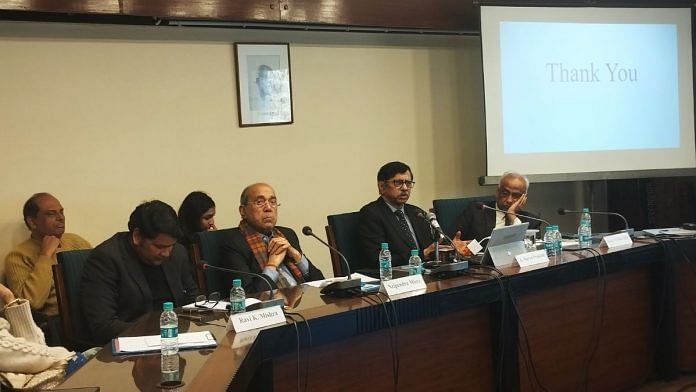New Delhi: India doesn’t need to look at other countries to build on its democratic institutions. The answers lie in the country’s Vedic past. This was the thrust of A Surya Prakash’s lecture, ‘Democracy in Ancient and Modern India’ at the Prime Ministers’ Museum and Library on 15 February.
“India is a secular, liberal and democratic nation. The roots of the fundamental principles of the Indian Constitution are enshrined in the Vedas,” said Prakash.
There is ample evidence to support this with specific mentions of a thriving republic in ancient India, he added, referring to the ‘sabha’ and ‘samiti’ (houses in the assembly) in the Rig Vedic period. These democratic practices find mention in the Atharva Veda as well.
The ‘samiti’ was an assembly, a group of people addressing political, religious and philosophical matters. The ‘samiti’ not only elected the ‘Rajan’ (head of a community), but also focused on prayers and religious ceremonies. The ‘sabha’ was mostly selected. Both served as a counter to check the powers of the king.
Prakash, who is vice-chairman, executive council of the Prime Ministers’ Museum and Library (PMML), has been studying democracy, Parliament and the Constitution of India for over 35 years, and is the author of Democracy, Politics & Governance (2021). In his lecture, he straddled both modern and ancient India to show that India of today is the result of systems established in the past. He took the audience back to ancient India to explore complex and democratic governance systems.
“The core idea of democracy flourished in many of these societies at that time in India,” he said.
Also read: India’s cultural renaissance has begun. IGNCA leading it with Vastu, Vedas, and ‘new’ history
Tracing democracy’s ancient roots
Prakash delved into the history of the Licchavi community (6th–5th century BCE), which was known for its republican government. The Indo-Aryan Shakya clan—which Siddhartha Gautama is said to have belonged to—also serves as an ancient example of governing bodies where various forms of government coexisted.
Terms like loktantra, jantantra, prajatantra, gantantra, and rajantra, which are commonly used in general debates today, were also in use during that time. These communities had elected representatives alongside kingships, said Prakash. Kings were expected to adhere to the common rules of dharma. And in later centuries, when kings became sovereign rulers, they were not exempt from the code of conduct prescribed by dharma.

“Dharmashastras placed strict restrictions on the arbitrary exercise of power by the state. These texts outlined a detailed list of royal duties known as Rajdharma,” he added.
Constitution and freedom
Prakash examined the Constitution of India and the rights granted to minorities to strengthen his argument. The state having no religion and plurality of thought can be found in ancient India.
“We are citizens of Bharat and it has had all these traditions going back 3,000 years or more. So, our Constitution actually is the “saransha” of the great thoughts that were there millennia ago.”
He gave the example of Article 25 of the Constitution, which guarantees citizens the right to freely profess, practice and propagate religion. Article 28 prohibits religious instruction in educational institutions that are fully funded by the state.
“I have studied dozens of constitutions across the world, and there is no constitution in the world which has this basket of rights for the minorities. It is so comprehensive and simply unbelievable,” said Prakash.
He recited several shlokas from the Veda. “The truth is one, but the sages call it by different names,” he said, adding that it embodies the universalism of Hinduism.
The shlokas illustrate the open-mindedness of Vedic society and culture, which welcomes great and valuable ideas and works from all sources, regardless of their origin, he said. “Hindu states did not impose jizya (tax) on those who practiced other religions.”
At one point in his lecture, he hailed Prime Minister Narendra Modi for embracing this and applying it in modern India. “Among our prime ministers, he is probably the first to focus so much on the central idea emanating from India, which is ‘Vasudhaiva Kutumbakam,” said Prakash. The Sanskrit phrase, which means ‘One Earth, One Family, One Future’ was the theme of the G20 summit.
Also read: RSS influence over govt institutions grows with new IIMC & Prasar Bharati appointments
India’s plurality
But for Prakash, this awareness is just the beginning of India’s journey to reclaim the past from the British education and governance system, which attempted to alienate the country from its history. The education curriculum was designed in a way to give the impression that Indians are devoid of history, culture, and dignity and needed to be civilised.
The fact that India remained true to its secular roots after Partition is an important point in our history, he said, adding that it showed India’s pluralistic character where liberty, equality, and fraternity were given utmost importance.
“Without these three, how can you accept the whole world as a family?”
(Edited by Prashant)




What a load of nonsense. A nation where caste was and is central to a person’s existence can never be democratic.
That would really be stretching the point, to make a point. Britain, without a written Constitution, the United States, with the Vice President heading the Senate or the Rajya Sabha, France with its inspiring foundational concepts of Liberty, Equality, Fraternity, these have been the sources from which our noble parchment has drawn copiously. To be honest, India has a long tradition of absolute rulers, till the very eve of Independence. 2. On a lighter note, the epics do not contain launch codes for SLBMs, so perhaps the armed forces should not be looking to them for strategic concepts.